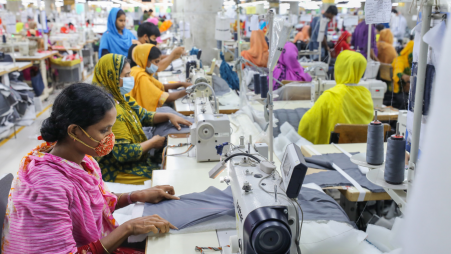10 power cuts in 28 hours! Textile industries desperate for a break

Daily power cuts have become so common that one almost does not think twice about them. But how many power cuts can one take in a day? Once, twice, four times? How about 10 times in 28 hours?
As power outages intensified in recent days, the manager of NZ Apparels Limited in Narayanganj started to count the power cuts and the number of times his factory units had to be restarted, a time consuming task.
On 6 July, he recorded, the textile mills faced 10 outages – each lasting for an hour – in a 28-hour span beginning at 11am.
The factory owner shared this experience in their internal WhatsApp group. The Business Standard has obtained a screenshot of the message.
Power cuts damaging expensive equipment
Saleudh Zaman Khan, managing director of the mill, told TBS, "Frequent load shedding is damaging around 15 types of our expensive and sophisticated machinery and electrical components, causing financial losses of approximately Tk4 lakh per month."
He further explained, "Since these machines are not available in Bangladesh, importing those takes significant time, leading to production halts and delays in fulfilling back-to-back letters of credits."
Regarding the extent of losses, Saleudh Zaman Khan, also the vice president of the Bangladesh Textile Mills Association (BTMA), said, "Last month, due to power cuts, my production losses exceeded Tk6 crore."
He explained that these disruptions have been delaying his shipments making him wonder how he was to pay his workers and bank instalments.
The textile owner mentioned that the current power crisis has already cut production to 40%. If this persists, as it has for the past two days, production will fall further.
The situation is not unique to NZ Apparels. Textile mills across Narayanganj, Gazipur, Savar, Narsingdi, and Manikganj are grappling with severe gas and electricity shortages.
40% drop in production in textiles
Mohammad Ali Khokon, president of BTMA, which represents approximately 1,700 textile mills, said in a press conference that due to these crises, their member mills have experienced a 40% drop in production on average.
Units involved in spinning, dyeing, and printing within the textile industry heavily depend on gas. Similarly, ceramic, steel and other factories are also reliant on gas and are facing similar challenges, as per industry sources.
Despite these difficulties, entrepreneurs have been attempting to sustain operations by relying more on available power supply.
Little Star Spinning Mills, located in Savar on the outskirts of the capital, experienced more than six hours of power outage starting at 9am on Sunday, lasting for the next 12 hours. Throughout the day, the gas pressure remained at only 1.5 pounds per square inch (PSI), well below the standard of 10 PSI.
Its Chairman Khorshed Alam shared a message in the textile owners' internal WhatsApp group on the same day, which was obtained by TBS.
In the message, he said, "Out of 54,000 spindles in our mill, only over 5,000 are running."
Speaking to TBS, he added, "In my 37 years of experience in the spinning textile industry, this is the toughest time I've faced, and the current situation is unbearable."
A textile entrepreneur, speaking anonymously to TBS, reported losses exceeding Tk1.38 crore in the last two months. TBS talked with five other textile millers who also confirmed they were struggling with the ongoing gas and power crisis.
Additionally, TBS obtained images showing production lines halted at some textile mills due to interruptions in power supply and shortages of gas. These challenges have pushed textile mills to the brink of permanent closure.
What do the authorities say?
The senior general manager of Narayanganj Palli Bidyut Samity, Nur Mohammad, acknowledged that power cuts have worsened in certain parts of Narayanganj.
"Previously, we had about two hours of power cuts per day. But, in the last two days, it has increased significantly. In areas like Rupganj and Araihajar, we are seeing eight to 10 hours of power cuts daily," he told TBS.
Explaining the cause, he said, "The problem stems from the decreased production at Kanchan Power Plant [Kanchan Purbachal Power Generation Limited] and its unavailability on the national grid."
Despite the challenges, he expressed hope that the situation would improve by next week. He mentioned that the power demand in Rupganj and Araihazar areas alone is approximately 210MW.
Md Kamruzzaman Khan, director of Petrobangla, expressed optimism that the gas supply situation would improve by the middle of this month. He told TBS, "After repairs, a Floating Storage Regasification Unit (FSRU) damaged by cyclone Remal has departed Singapore and is expected to arrive in Bangladesh by 13 July.
"Commissioning will take an additional three days, and we anticipate it will be operational by 16 July, hopefully improving the situation from then."
Will exports, imports be affected?
The country's export-oriented apparel sector is the largest consumer of textiles. Local textile mills supply raw materials for over 80% of the country's knit garments and 40% of woven garments intended for export.
Concerns are growing about increasing reliance on imports due to reduced production in these mills, as indicated by a 13% rise in yarn imports over the past year, according to the BTMA.
Additionally, some garment exporters are facing delays in fulfilling orders due to irregular yarn or fabric dyeing services from local mills.
The CEO of Fatullah Apparels Limited in Narayanganj expressed worries about meeting foreign buyers' delivery schedules amid gas and electricity shortages affecting fabric supply. He has appealed to buying houses not to cancel orders or demand discounts.
"Some garments may need to be shipped by air," he noted, adding, "I used to rely entirely on local sources for yarn and fabric, but now I've had to start importing 70% of our materials. There's no other option."



 Keep updated, follow The Business Standard's Google news channel
Keep updated, follow The Business Standard's Google news channel















